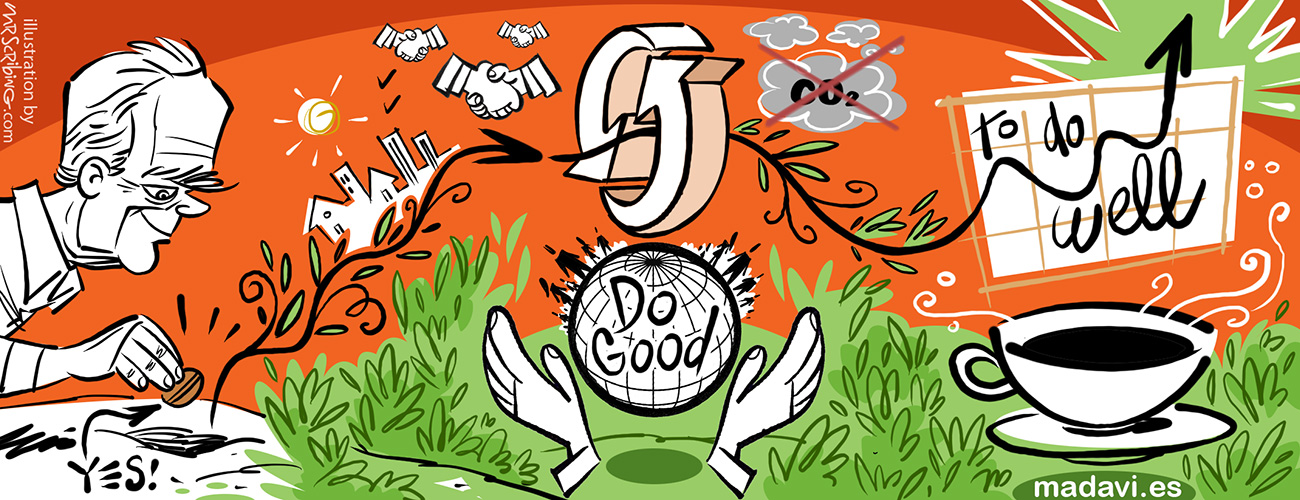Green Mountain Coffee Roasters is a company specializing in coffee located at Waterbury, Vermont.
Its growth has been exponential – it has multiplied its sales 34 times in ten years going from 137mm dollars to 4,700mm dollars, which is an increase of 3,400% -. This change was not merely financial since Green Mountain Coffee Roasters are ranked in the top 20 of Sustainable Company Actions. It is a strategy that we could call “Do Good to do Well.”
This is their story.
At the end of 1990 GMCR was growing at a good rate. It had tripled its sales force and doubled the size of its production plants. It was an exciting time for the organization. However, Bob Stiller, President and CEO, was planning a new phase and wanted to keep growing and achieve new goals. He wanted everything. He wanted his company to grow exponentially, to be sustainable, to reduce operational costs and create an ecosystem capable of contributing positively to society, from the coffee plant to the coffee cup.
He knew that to achieve his ambitions he would have to do things differently. This led him to plant the seed of Appreciative Inquiry. With this philosophy he managed an organizational change based on the alignment of strengths and aspirations and did so with all the stakeholders in the system, following the principle of Totality of Appreciative Inquiry. Bob Stiller states that “the process of Appreciative Inquiry has a personal significance for me because it allows me to construct starting from what is done well in my company.”
He has had exceptional results.
In June 2003, he carried out the first Summit of Appreciative Inquiry with 201 people simultaneously. The group was made up off employees, partners, consumers, and salespeople, members of the community, board members, and workers of socially responsible organizations. People of the community of all levels attended the event; the whole ecosystem was represented in one place.
Every process of Appreciative Inquiry starts defining the Affirmative Topic, that which you DO want to achieve. GMCR defined his Affirmative Topic in the following fashion in his first summit:
“Increasing our positive world benefit through phenomenal sustainable growth.”
During the Summit all the phases of AI were carried out – discovering the best of what is, imagining the best possible future, designing all the areas of opportunity and finally collective action – . This last phase, collective action is what generates change, namely, a lot of people moving in the same direction.
Such was the impact of the Summit that they decided to use Appreciative Inquiry as an essential element in their strategy and its execution. In reality in AI strategy and execution occur at the same time, thus creating the speed of the change. The following year, as every year, they repeated the Summit.
The second Summit was based on the following affirmative topic.
“Advance the personal and organizational effectiveness dimensions of growth- building our capacity for execution in alignment with our principles”
With this process they managed to generate a disruptive organizational change, which was both exponential and inclusive, involving the entire ecosystem in the organizational development.
The two most relevant factors for success has been the capacity of execution and having as a stake a higher purpose that goes further than simply the profit and loss accounts.
According to Stiller, the execution is the key “the key to success has been the capacity to execute. Other companies can copy our product, but the capacity to work together as a team, (he is referring to the ecosystem as a whole), is what really differentiates us in the market”. Executing in a dynamic and synchronized fashion is a competitive advantage.
This is the opinion of Bob Stiller regarding purpose, “Green Mountain Coffee Roasters views profit as a means of achieving a higher purpose to do good for others around the world. The focus on making a difference in the world comes from an understanding that business and communities are dependent on each other for long-term successes”.
As a result of this vision GMCR has created its own ecosystem that includes all the participants in the chain of value, from the coffee producers to the companies in Asia and Europe that build the machines and the home appliances. GMCR is committed to the environmental and social challenges of the communities where they work. The company makes an effort to improve the land where it cultivates coffee as well as the land of the farmers. At the same time the relations between clients and suppliers are maintained just and transparent. This connecting link of confidence and support nurtures an ecosystem which feeds back upon itself; the communities support the company and the company supports the communities…
Some interesting facts…..
- Financial growth: Between 2004 and 2014 sales have grown from 137mm to 4,700mm and profits from 54 mm to 1,815mm. An increase of 3,400% in sales and profits!
- Green Mountain Coffee Roasters have invested in 2015 8.9mm in the development of communities and only in that fiscal year did they help more than 1,300 organizations to develop.
- It has been recognized in the top 10 of the 100 Best Corporative Citizens during the last five years running, having been first in two of them.
- The company compensates 100% of its direct greenhouse emissions and gives priority to the reduction of residuals, the responsible use of energy and the sustainability during the life cycle of its products.
- Bob Stiller firmly believes in the positive impact that AI generates. So much so that its foundation donated 10mm dollars to Champlain College in order to establish AI as an essential part of the Business Studies curriculum.
It is a good example of “Do good to do well” and the only possible path to success in the long term.


